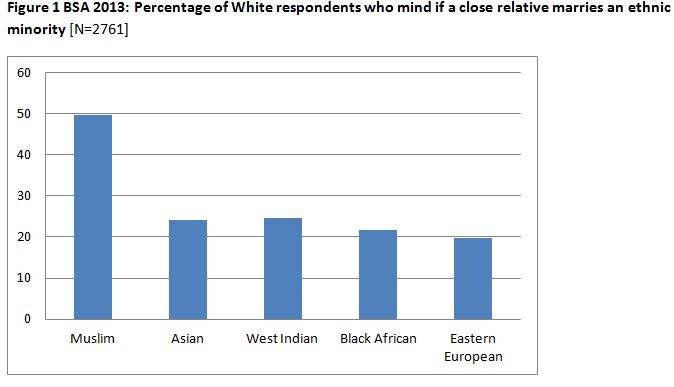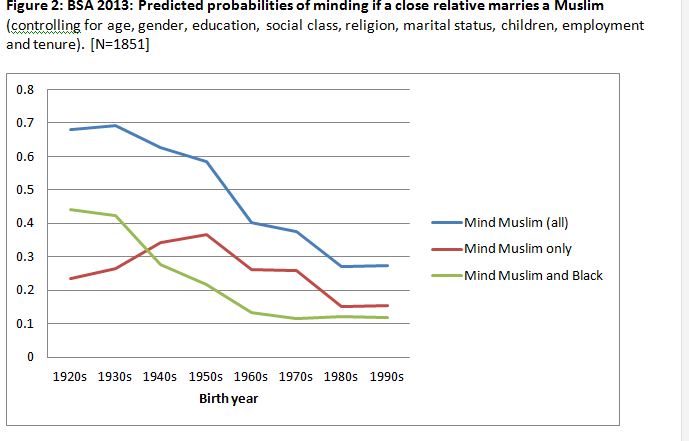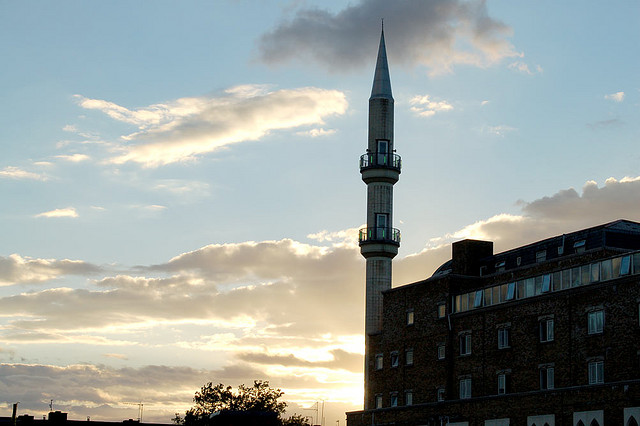Muslims continue to be less accepted than other minorities in Britain
Muslims in Britain are often the subject of scorn, derision, and fear, with the press and populist politicians frequently linking Islam with terrorism or other crimes. Ingrid Storm considers the reasons why prejudice, in what is often described as an open and tolerant nation, continues to disadvantage Muslims in the UK.
Credit: Lee Dad, CC BY NC 2.0
Muslims are less accepted in Britain than other religious and ethnic minorities. Such heightened negative attitudes could contribute to discrimination in the labour market, segregation and social conflicts. In a recent Policy@Manchester blog by Rob Ford, we could read that social distance to ethnic minorities in Britain has declined rapidly since the 1980s; so why are Muslims still subject to negative attitudes?
One possible explanation is that while racial prejudice has declined, people are still concerned about cultural differences. One argument is that ‘cultural racism’ hasreplaced biological racism as the justification for negative attitudes and discrimination among younger people.
However, data from the British Social Attitudes Survey 2013 calls this argument into question. The difference in attitudes between older and younger generations is similar for Muslims as for other groups. Younger people are more accepting of all ethnic minorities, Muslims included. It is more likely that negative media portrayals of Muslims and associations with Islamist terrorism amplify prejudice against this group among all parts of the population.
In 1989 more than half the white respondents in the British Social Attitudes survey said they would mind if a close relative married an Asian or a West Indian, whereas in 2013 this has declined to less than a quarter. The only exception to the trend is the negative response to potential Muslim in-laws which was twice as high, at almost 50% in 2013, as shown in Figure 1.

If younger people justify their prejudice on the basis of culture rather than race, we would expect younger generations of white Britons to express more distance to Muslims (a religious minority), whereas older generations should express more distance to, for example, Black Africans (a racial minority).
However, Muslims are also much less accepted among the oldest respondents. Furthermore, the difference between older and younger generations is much larger than the generational difference in attitudes to any of the other minority groups.
In order to make better sense of these results we can distinguish between two forms of anti-Muslim sentiment. Firstly, there are those who have a general ethnic prejudice disliking Muslims because they are viewed as racially as well as culturally different from whites. Secondly, there are those who have a specific anti-Muslim prejudice, even if they are otherwise tolerant of ethnic minorities.
All the 1,851 white people who were asked about Muslims were also asked about either Black Africans or West Indians. A significant proportion (27%) say they mind Muslims as potential in-laws, but not Blacks, whereas very few (1.6%) mind Blacks without also objecting to Muslims as potential in-laws.
Those who object to Muslim and Black in-laws are mostly over 50, as shown in Figure 2. These may be generally ethnically prejudiced and express social distance to Muslims because they belong to an ethnic minority rather than for any cultural or religious characteristics. Those who mind Muslims, and not Blacks, however are more likely to be middle aged.
The increase in the specific anti-Muslim bias among those born in 1930s, 40s and 50s could indicate that people’s prejudices shifted from racial to cultural concerns. But both racial and cultural social distance has since decreased, as seen in the youngest birth cohorts. If racial prejudice had been replaced by cultural prejudice it looks as if it affected only a few generations.

The question remains why there is a heightened bias against Muslims, and why it is particularly high for those who came of age in the 1960s and 1970s. This generation scores high on measures of tolerance and liberal values, which can explain their low levels of racial prejudice. They are, however, also one of the first generations to generally describe themselves as non-religious.
Attitudes to Muslims in Britain are considerably more negative than attitudes to Jews, Buddhists and Hindus. In other words, it is not being a religious minority in itself that make Muslims a target for prejudice. However, the level of religious belief and commitment among Muslims is on average higher. This, combined with media reports which focus on cultural differences, may inspire a view of Islam as a threat to secular liberalism, as discussed in my 2011 paper on religion and attitudes to immigration. This view may be especially pronounced among those who took an active stand against their parents’ generation on questions of traditional religiosity, gender equality and individual autonomy.
Such a perception of cultural threat makes Muslims a target of prejudice for the young as well as the old. As Sobolewska and Ali’s analysis shows, these views may be fuelled by uneven media coverage in left wing as well as right wing newspapers.
The question about accepting a new person into the family is arguably one that makes people think of real life individuals and personal experiences rather than ‘Muslims in general’. Nevertheless, a public debate which focuses on cultural incompatibility, religious extremism and violence could potentially affect a person’s views not only of world events, but of their neighbours, friends, colleagues and potential in-laws.
In summary, the disproportionate unpopularity of Muslims as marriage prospects for close relatives is probably not the result of a general objection to cultural difference which is taking over from a general hostility to physical difference. Rather, a particular negative perception of a specific religious group has been reinforced by news reports, and created new justifications for prejudice.
Nonetheless, it is important to stress that this enduring hostility does not override generational differences. Younger people may express more social distance to Muslims than to other groups, but they are also considerably more accepting than their parents.
—
Note: this post represents the views of the author, and not those of Democratic Audit or the LSE. It originally appeared on Manchester Policy Blogs and is reposted with permission. Please read our comments policy before posting.
—







 Democratic Audit's core funding is provided by the Joseph Rowntree Charitable Trust. Additional funding is provided by the London School of Economics.
Democratic Audit's core funding is provided by the Joseph Rowntree Charitable Trust. Additional funding is provided by the London School of Economics.
I read, with interest, this article which proposes that the fault lies with the rest of British society. This could be considered the right outcome were it not for the fact that this would be the outcome if the same sort of poll was held in every western country with large numbers of Muslim immigrants.
Taking this into account, It appears to me that the problem lies with the Muslims themselves. Many do not want to integrate into the societies of their chosen country. Here we have FGM, while not the sole religion involved in this barbaric practice, it is the largest one. Women are treated like second class citizens, Sharia Courts have been allowed to judge on issues such as marriage; again the women are the losers. Women wearing veils; this is a cultural practice from the middle east that predates Islam and is being spread worldwide by the Wahabis from Saudi. I’ve never heard of a Hindu Council of Britain; however, there are many Muslim pressure groups working with the UK.
As for Homophobia; this is a term constructed to curtail the criticism of a religion and a culture that is far from being perfect.
An Islamophobe; A non-Muslim who knows more than they are supposed to about Islam.
No religion is above criticism as are many other tales from the distant past. We don’t have any blasphemy laws in this country except for the religion followed by Muslims. Try saying something about Mohamed in public and see how long it takes until you are arrested. Again, another reason why Islam comes top of this survey.
I think your work is of great importance and I hope it gets the attention it deserves from those in governments and in positions to improve matters.
I would like to query your (very) brief comments on the media.
Based on study of over 9000 media news articles over the last six years I would not say media reports “…. focus on cultural differences” or that views are “…. fuelled by uneven media coverage”.
May I draw your attention to what Lord Leveson said in his report following his extensive year-long inquiry into the culture, practices and ethics of the press “…. it is important that stories …. are accurate, and not calculated to exacerbate community divisions or increase resentment. ….. the majority of the Press appear to discharge this responsibility with care ….”
The fact is the overwhelming majority of news stories and articles are an accurate and fair reflection of reality.
There is no evidence to suggest large numbers of favourable stories about Islam and Muslims are being ignored.
The simple truth is a great many Muslims inspired by Islam as they see it do and say a great number of things from the trivial to the very important that annoy, puzzle or repulse most non-Muslims and consequently they are reported by the media. To call them “cultural” differences is a great misnomer.
See these two reports:
https://islamsurveyed.blogspot.co.uk/2014/01/islamophobia-in-media-missing-pieces.html
https://islamsurveyed.blogspot.co.uk/2015/02/readers-comments.html
[…] https://www.democraticaudit.com/?p=12510 […]
Is anyone really surprised ?
In summary, the disproportionate unpopularity of Muslims as marriage prospects for close relatives is probably… https://t.co/mdTDuGN8w3
Widespread halal,Take over towns, Benefits, nhs, Police ignored for yrs them raping kids, yet they still play victims https://t.co/UvbwyDVVAZ
Why are you comparing a religion to race? How stupid are the so called ‘intellectuals’ these days.
Muslims continue to be less accepted than other minorities in Britain, argues Ingrid Storm https://t.co/DDJNmMlCTd
Muslims ‘less accepted’ than other minorities in Britain https://t.co/BkAiB4Quuh https://t.co/Bzbx1Kawbb
RT @Everyday_Muslim: Muslims continue to be less accepted than other minorities in Britain – https://t.co/ntMKDRliqf
Muslims continue to be less accepted than other minorities in Britain https://t.co/Tkmdru1ahj
I’m intrigued by your second graph. After controlling for age you find a relationship with age?
Muslims continue to be less accepted than other minorities in Britain https://t.co/lO5jd46AqY